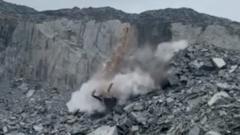How Are Trade Deals Negotiated? Uncover the Secrets!

Understanding Trade Deal Negotiations in Today’s Climate
Trade deals have become a focal point in global politics, especially with the recent actions of the United States under President Donald Trump. His administration's approach to tariffs and trade agreements has changed the dynamics of negotiations significantly. While traditional trade discussions aimed for mutual benefits, the current environment appears more defensive and accusatory. This article delves into the intricate process of trade negotiations, how they have evolved under recent political pressures, and the role of trust and strategy in reaching agreements.
The Evolving Landscape of Trade Negotiations
In the past, trade negotiations were primarily characterized by cooperation and an emphasis on finding common ground. However, the advent of a more nationalistic approach to trade has altered the tone. Former Canadian trade negotiator Jason Langrish notes that the current atmosphere is “defensive,” reflecting a shift in how nations engage in discussions. The traditional model of upgrading existing agreements has now given way to a climate where countries must react to aggressive tactics, such as tariff threats.
The ongoing negotiations between Canada and the United States serve as a pertinent example of this shift. With a looming deadline, Canadian negotiators find themselves compelled to engage in discussions they did not initiate, underscoring the reactive nature of contemporary trade talks. The negotiations are now marked by a sense of urgency and pressure, diverging sharply from the collaborative spirit that once defined them.
The Mechanics of Trade Deal Negotiations
Understanding how trade deals are negotiated requires insight into the structured process that typically unfolds behind closed doors. Each side appoints a chief negotiator, and teams are organized around specific areas of focus, such as tariffs, regulations, and government procurement. This structured approach allows for detailed discussions, with sub-negotiators tackling specific issues within the broader negotiation framework.
Negotiations can take years to finalize, involving extensive deliberations and strategic concessions. According to former EU negotiator Karl Falkenberg, typical days in negotiations can be grueling, often requiring long hours and intense focus. While the portrayal of negotiations in popular media often emphasizes conflict, the reality is that successful outcomes depend on building trust and fostering connections between negotiating parties.
The Role of Trust in Negotiations
Wendy Cutler, a seasoned negotiator for the US Trade Representative's Office, highlights trust as a critical tool in the negotiation arsenal. While complete trust may be unattainable due to each side’s national objectives, the ability to share proposals informally can facilitate smoother discussions. This level of trust is essential for both parties to feel comfortable exploring creative solutions that benefit both sides.
However, trust is often tested by external factors. Domestic political opposition and sectoral interests can create significant hurdles. As Langrish points out, those who stand to lose from a trade agreement often wield considerable political clout, complicating negotiations and potentially stalling progress. The interplay between internal dynamics and external pressures highlights the multifaceted nature of trade negotiations.
Challenges in the Current Trade Environment
The Trump administration's approach to trade has introduced a range of challenges for US negotiating teams. The ambitious goal of securing “90 deals in 90 days,” as stated by trade adviser Peter Navarro, exemplifies the pressure that negotiators face. Cutler argues that such an aggressive timeline is unrealistic and has strained resources, making it difficult to engage meaningfully with multiple countries.
The complexity of orchestrating numerous agreements simultaneously can overwhelm negotiating teams, detracting from the quality of discussions. As the US pursues agreements with various nations, including the UK, Vietnam, and Japan, the need for a more strategic and measured approach becomes evident. This is compounded by the unpredictable nature of tariffs, which can fluctuate dramatically, adding to the uncertainty faced by businesses and trade lawyers alike.
The Increasing Demand for Trade Legal Expertise
As tariffs rise and fall, the demand for legal expertise in trade has surged. Companies are increasingly seeking guidance on navigating the complexities of import and export regulations. Mollie Sitkowski, a partner at a US commercial law firm, notes that the current climate has led to an unprecedented workload for trade lawyers. Businesses require clarity on how tariffs will affect their operations and need legal support to adjust to rapidly changing trade policies.
This demand for legal expertise highlights the broader implications of trade negotiations. The outcomes of these discussions extend beyond political agreements; they have real-world consequences for businesses, consumers, and the economy as a whole. Understanding the intricacies of trade negotiations, therefore, is not just a matter of political interest but a necessity for those engaged in international commerce.
Conclusion: Navigating the Future of Trade Negotiations
The landscape of trade negotiations is undeniably shifting. As the world grapples with the implications of aggressive trade policies and rapid changes in international relations, the process of negotiating trade agreements has become more complex and contentious. The emphasis on trust, the pressures of domestic politics, and the demand for legal expertise all play crucial roles in shaping the future of trade discussions.
As we move forward, it is essential to consider how these evolving dynamics will impact global trade relationships. Will nations find a way to navigate these challenges and reach mutually beneficial agreements, or will the current climate continue to breed conflict and mistrust? The answers to these questions will undoubtedly shape the future of international trade.
FAQs
What are the key roles in trade negotiations?
Trade negotiations typically involve a chief negotiator for each side, along with teams focused on specific areas such as tariffs and regulations. Each team may have sub-negotiators dedicated to particular issues.
How has the tone of trade negotiations changed recently?
The tone has shifted toward a more defensive and accusatory atmosphere, primarily due to aggressive tactics like tariff threats. This contrasts sharply with the more collaborative approach seen in past negotiations.
Why is trust important in trade negotiations?
Trust facilitates open communication and the informal sharing of proposals, which can lead to more creative solutions and successful agreements. Without a degree of trust, negotiations can become stalled or contentious.
As the world of trade continues to evolve, how do you think nations can rebuild trust in their negotiations? #TradeNegotiations #GlobalTrade #EconomicPolicy
Published: 2025-07-23 23:50:08 | Category: technology



